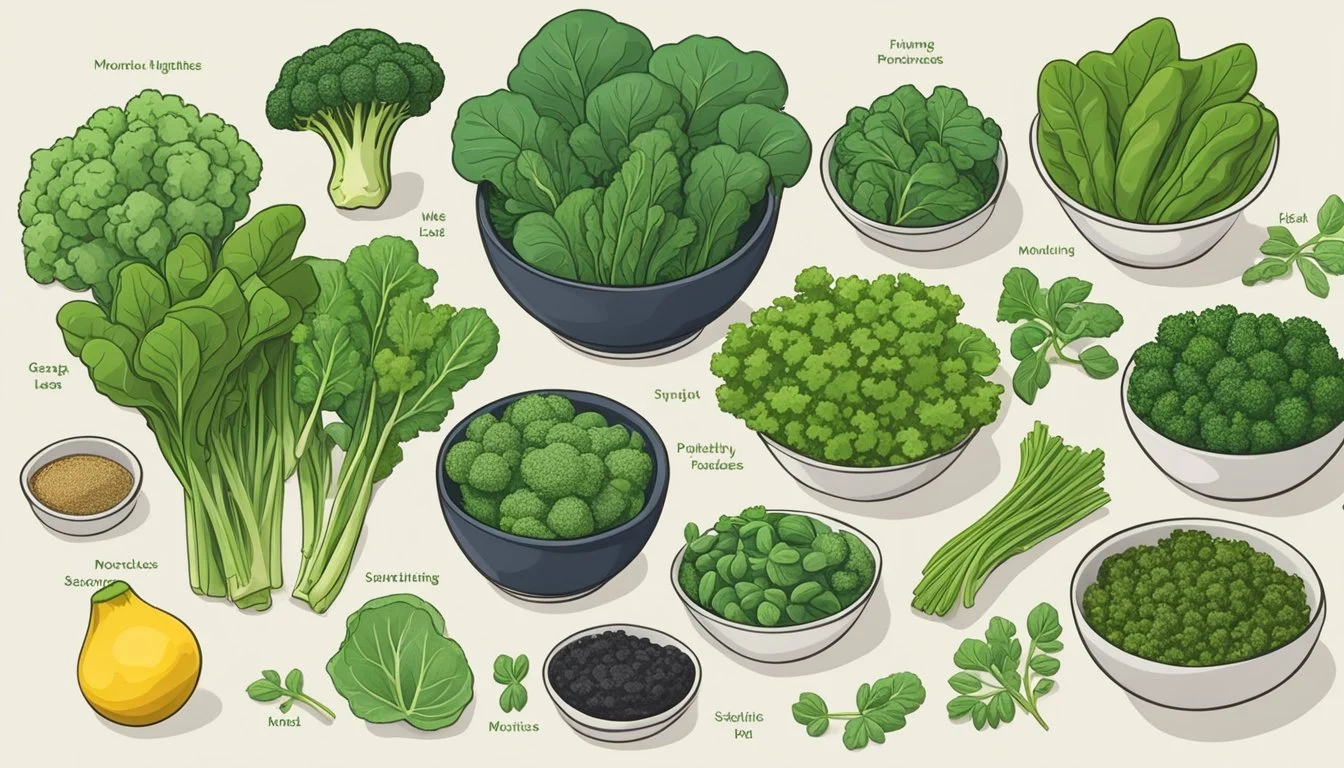Moringa Leaves Substitutes
The Best Alternatives for Nutrient-Packed Recipes
Moringa leaves, known as Moringa oleifera or the "miracle tree," have gained widespread popularity for their dense nutritional profile and numerous health benefits. This superfood is packed with essential vitamins, minerals, and antioxidants, making it a great addition to various dishes. However, if Moringa leaves are unavailable, several substitutes can provide similar benefits and flavors.
Spinach and kale are excellent substitutes for Moringa leaves, as they share a comparable nutrient density and versatility in cooking. These leafy greens can be used in soups, stews, and salads, mimicking the slightly bitter taste of Moringa. For those looking to experiment with flavors while retaining nutritional value, Swiss chard and collard greens offer a suitable alternative as well.
Additionally, incorporating herbs like parsley and cilantro can serve as a creative twist when substituting Moringa leaves. Though not as nutrient-rich, they bring unique flavors and health benefits to the table. Opting for these substitutes ensures that dishes remain both delicious and health-focused, even without the original ingredient.
Understanding Moringa Leaves
Moringa leaves are known for their exceptional nutrient content and potential health benefits. They contain essential vitamins, minerals, and antioxidants, making them a valuable addition to various diets.
Nutritional Profile
Moringa leaves are packed with nutrients. They provide essential vitamins such as vitamin A, C, and E, along with minerals like calcium, iron, and potassium. The leaves are particularly rich in protein, making them a great option for vegetarian and vegan diets. Moringa leaf powder, which is made from dried leaves, is often used to boost nutrient intake in smoothies, soups, and other dishes.
Moreover, moringa leaves have a high concentration of antioxidants, which help combat oxidative stress in the body. These antioxidants include quercetin and chlorogenic acid, both known for their health-promoting properties.
Health Benefits
The health benefits of moringa leaves are extensive. They possess anti-inflammatory properties, which can help reduce inflammation in the body and mitigate the risks associated with chronic diseases. Additionally, the antioxidants in moringa leaves play a crucial role in protecting cells from damage.
Moringa leaves may also aid in regulating blood sugar levels, making them beneficial for individuals with diabetes. Consumption of moringa has been linked to lower cholesterol levels and blood pressure, contributing to better heart health. The rich iron content also supports improved blood health, especially important for those with anemia.
These leaves are versatile and can be used fresh, dried, or powdered, making them a convenient and powerful addition to various dietary regimens.
Substitutes for Moringa Leaves
Moringa leaves, known for their high nutrient content and health benefits, can be substituted with other leafy greens and herbs. Below is a discussion on various alternatives such as spinach, kale, and other herbs that can fit the nutritional and culinary role of moringa leaves.
Spinach
Spinach is a commonly used substitute for moringa leaves. It is rich in iron, vitamin C, and vitamin A. This makes it an excellent alternative in terms of nutritional content. Spinach can be used in soups, stews, and salads just like moringa leaves.
Spinach also boasts antioxidant activity and anti-inflammatory properties. It is readily available and easy to cook, which makes it a convenient choice. When using spinach as a replacement, fresh or frozen varieties can be utilized, though fresh spinach is generally more nutritious.
Kale
Kale is another effective substitute for moringa leaves. It is high in vitamins and minerals, including calcium and vitamin K. Kale’s nutrient profile matches closely with that of moringa leaves, making it a strong contender as a substitute.
Kale can be used in a variety of recipes, including smoothies, soups, and casseroles. It has a slightly bitter taste, similar to moringa, which can be balanced by adding acid or sweeteners. Kale also offers antioxidant benefits, contributing to overall health.
Herb Alternatives
For those seeking a different flavor or culinary experience, herbs such as parsley, cilantro, or basil can be used as substitutes. While these herbs do not match the exact nutritional profile of moringa leaves, they still provide essential vitamins and minerals.
Parsley is rich in vitamin C and iron, making it a valuable addition to meals. Cilantro offers a unique taste and contains nutrients like vitamin K. Basil adds a fragrant aroma and is a good source of vitamin A and calcium. These herbs can particularly enhance dishes like salads, pastas, and garnishes.
Incorporating Substitutes in Diet
Using substitutes for moringa leaves can provide variety and nutrient diversity in everyday meals. This part of the article focuses on practical ways to integrate other leafy greens and homemade moringa alternatives into your diet.
Cooking with Leafy Greens
Leafy greens such as spinach, kale, and Swiss chard are excellent alternatives to moringa leaves. These greens can be easily integrated into dishes like soups, salads, and curries.
Spinach serves as a good substitute, rich in iron and calcium. Kale provides similar antioxidant benefits and is ideal in rice dishes or as a side with fish. Swiss chard has a slightly bitter taste, comparable to moringa, and works well in savory dishes.
Use these greens similarly to how moringa is used: in smoothies, as moringa leaf powder in soups, or cooked in stews. They add color and nutritional value, ensuring a balanced and varied diet.
Creating Moringa Alternatives at Home
Making homemade moringa alternatives is a simple way to ensure consistent nutrient intake. Homemade powders can be created by drying and grinding greens such as spinach or kale. This method extends the shelf life of these substitutes.
Dried leafy greens can be stored in airtight containers and used similarly to moringa powder. Homemade alternatives can be added to teas, enhancing the flavor and benefits akin to moringa tea.
For those allergic to dairy, consider these powders as substitutes in smoothies or milk-based recipes. This keeps meals nutrient-dense without compromising personal dietary restrictions.
Culinary Applications
Moringa leaves are known for their nutritional value and versatility in various cuisines. When looking for substitutes, it's essential to consider the flavor and nutritional profile to ensure they complement the dish.
Recipes Using Moringa Substitutes
Spinach
Spinach is a popular substitute due to its similar nutrient content and mild flavor. It can be used in soups, salads, and smoothies. To prepare, simply rinse and chop the spinach before adding it to your dish.
Kale
Kale has a robust flavor and is packed with vitamins. It can be used in stews, stir-fries, and baked dishes. Before cooking, remove the stems and chop the leaves.
Swiss Chard
Swiss chard provides a slightly bitter taste and is rich in minerals. It's suitable for sautés and casseroles. Wash and slice the chard before incorporating it into recipes.
Potential Health Implications
Moringa leaves are praised for their nutritional and medicinal benefits, but they can also pose risks such as adverse effects and interactions with medications. Thoroughly consulting healthcare providers before use is advised.
Adverse Effects and Allergies
Moringa leaves contain various bioactive compounds that might trigger allergies or sensitivities in some individuals. Mild side effects can include stomach upset, heartburn, or diarrhea. More severe reactions may involve difficulty breathing, swelling, or skin rashes.
Consumption beyond recommended doses can cause toxicity, leading to issues like liver and kidney damage. Those with existing conditions should be particularly cautious. Consultation with healthcare providers is crucial to avoid unexpected reactions.
Interaction with Medication
Moringa leaves can interact with several medications, potentially altering their effectiveness. For instance, they may amplify the effects of blood thinners, increasing the risk of bleeding. Additionally, they might lower blood sugar levels, complicating the management of diabetes.
Those taking thyroid medications should be aware that Moringa could affect thyroid function. Healthcare advisories emphasize the importance of professional guidance before incorporating Moringa into dietary routines, especially for individuals on medication.
Sustainability and Environmental Impact
Moringa, known for its resilience and nutritional benefits, offers a significant advantage in sustainable agriculture. However, understanding the sustainability and environmental impact of both Moringa and its substitutes is crucial.
Growing Moringa and Its Substitutes
Moringa thrives in arid regions with minimal water and soil nutrients, which reduces its environmental footprint. This resilience makes it an eco-friendly option for sustainable agriculture. Additionally, Moringa follows a zero-waste approach, where various parts of the plant are utilized, minimizing agricultural waste.
On the other hand, traditional leafy green substitutes like spinach or kale might require more intensive agricultural practices, such as higher water and nutrient inputs. Organic farming methods can mitigate some environmental impacts, but Moringa's low resource requirement remains a distinct advantage. By comparing these practices, it becomes clear why Moringa is considered a climate-smart solution.







